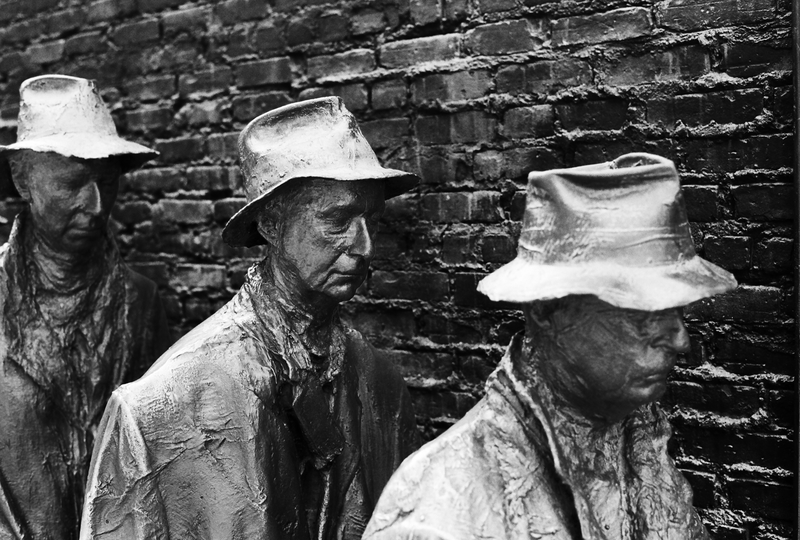The motto for the Great Depression was to “do what you had to” in order to survive for millions and millions of people worldwide.
That led to some pretty profound lessons that still apply, even in our world today, especially if you are survival minded.
Families traveled to wherever the work happened to be. They stuck together as much as possible.
If possible, homes were very often refinanced in an effort to save the family residence.
Clothing had to last as long as possible and women (mostly) became expert seamstresses, especially at alterations. One creative woman used the fabric from the inside of a casket to sew beautiful holiday dresses for her children.
It wasn’t unusual for people to live out of their cars and trucks.
When there was no cash, payment was made with eggs, fresh milk, or produce.
A family with a cow and a garden was considered “rich”. Those two advantages alone meant the difference between a well-fed family and one that was near starvation.
Many Americans were too proud to accept charity or government help.
When the soles of shoes were worn through, pieces of rubber tires were used as replacements. There was little choice but to repair them in any way possible.
Thousands and thousands of entire families were displaced. Very often, grandparents, aunts, uncles, and cousins ended up living in one house, or one vehicle, as the case may be.
Anything that could be freely collected and sold, was. Driftwood was collected, split and sold as firewood.
Banks closed quickly and without giving any notice. You never knew ahead of time when your own bank would close its doors.
Back in those days, banks were revered. It never occurred to anyone that a bank could close and their money would be gone forever.
Most people were willing to do any type of work. My own relatives became moonshiners!
Just about everyone had a garden and most gardens were enormous. Since 20% of the population still lived on farms, even those in cities still had country roots and gardening know-how.
Hunting and fishing were major ways in which families were fed.
Everyone, including the kids, found ways to earn money. There was a team mentality that brought everyone together for a common goal.
There was virtually no sense of entitlement. Everyone knew they would only survive if they worked hard to do so.
The Great Depression affected people in all walks of life. Only the most elite were immune from its effects.
When banks closed, you were left with, literally, only the cash in your pockets or hidden away at home. Everything else was GONE.
Many discovered strength through optimism and looked at their disadvantages as personal challenges that could be overcome with ingenuity and hard work.
Foods that would normally have not been eaten became commonplace at the kitchen table, such as bean sandwiches and codfish gravy. Recipes from this era provide a fascinating look at the day to day life of average people.
Meals were simpler than those we eat today and, therefore, cheaper. There were virtually no prepared foods at grocery stores.
Families learned to shop at the very last minute on a Saturday night to get bargains on fresh produce that would go bad over the weekend. (Stores were closed on Sundays.)
Learning how to forage and find edible plants helped many families fill their dinner plates. Things like nuts and wild asparagus were treats and often entire families would grab a pile of gunny sacks and head to the good foraging areas for the day. Finding free food was how some families survived.
To add different types of food to their meals, families swapped produce with each other.
The seasons determined what you ate.
In some communities, there were group gardens on empty lots. Everyone had their own small plot and could grow whatever they wanted.
Many worked multiple part-time jobs, waking up before dawn and falling asleep long after dark.
Those with just a little bit more than others found odd jobs around their homes or property to provide employment to others.
Hanging wet sheets over doorways was a way to cool down a room or house during the summer. Hot air was slightly cooled as it passed through the wet fabric.
Walls were covered with everything from mud/clay, scrap pieces of wallpaper, newspapers, and tar paper.
Many spent their days walking the streets looking for work, anything at all that could bring in a few dollars or cents for their families. Often a “job” was just an individual task, payment was made when the task was completed, and the worker went on to look for the next job.
A jack-of-all-trades could often find work when others couldn’t. It paid to know a bit about plumbing, carpentry, painting, and home repairs.
There are a lot of lessons to be learned from those who survived the Great Depression, even though it happened almost 100 years ago.
Not so oddly, many of those lessons are the same ones that help some survivalists thrive in their efforts to be prepared.
To learn more about the Great Depression and how it applies to survival today, check out Survival Mom.

Ah this generation wouldn’t know what to.do.if a depression hit again
I use those methods of survival now